Hungerford T.W., Shaw D.J. Contemporary Precalculus: A Graphing Approach
Подождите немного. Документ загружается.

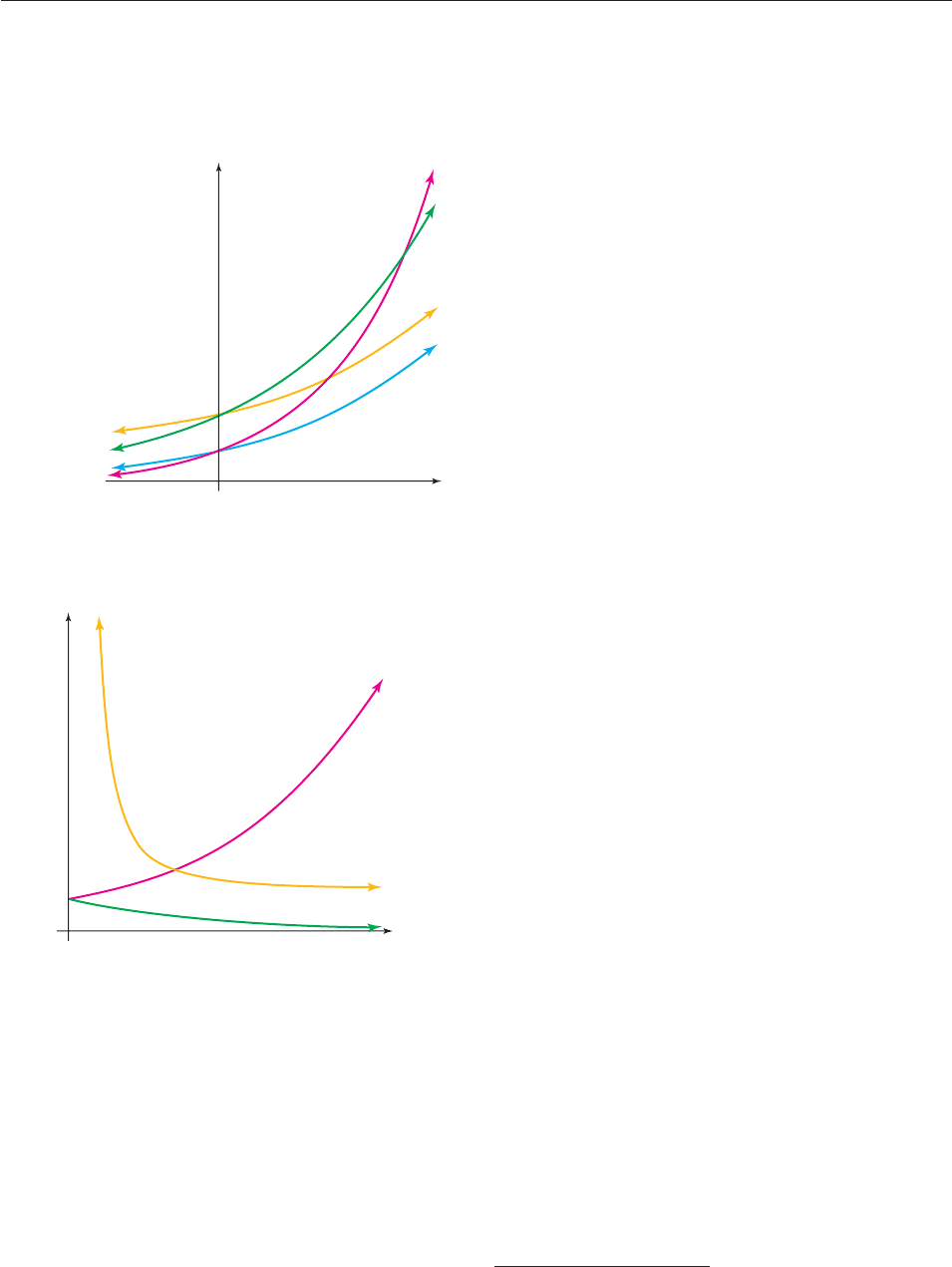
366 CHAPTER 5 Exponential and Logarithmic Functions
13. k(x) 3(2
x
) 14. g(x) 2
x1
15. f (x) 2
x2
5 16. g(x) 5(2
x1
) 7
In Exercises 17 and 18, match the functions to the graphs.
Assume a 1 and c 1.
17. f (x) a
x
g(x) a
x1
h(x) a
x
1
j(x) (a 1)
x
18. f(x) c
x
g(x)
1
c
x
h(x) c
1/x
In Exercises 19–23, determine whether the function is even,
odd, or neither (see Special Topics 3.4.A).
19. f (x) 10
x
20. g(x) 2
x
x
21. f (x)
e
x
2
e
x
22. f (x)
e
x
2
e
x
23. f (x) e
x
2
24. Use the Big-Little Principle to explain why e
x
e
x
is
approximately equal to e
x
when x is large.
In Exercises 25–32, find the average rate of change of the
function.
25. f (x) 3(4
x
) as x goes from 1 to 3
26. f (x) 3(4
x
) as x goes from 10 to 12
27. g(x) 3
x
2
x3
as x goes from 1 to 1
28. h(x) 2
x
as x goes from 1 to 2
29. h(x) 2
x
as x goes from 1 to 1.001
30. h(x) e
x
as x goes from 1 to 2
31. h(x) e
x
as x goes from 1 to 1.001
32. f (x) a
x
,a 0, as x goes from 0 to 0.001
In Exercises 33–36, find the difference quotient of the function.
33. f (x) 10
x
34. g(x) 5
x
2
35. f (x) 2
x
2
x
36. f (x) e
x
e
x
In Exercises 37–44, find a viewing window (or windows) that
shows a complete graph of the function.
37. k(x) e
x
38. f (x) e
x
2
39. f (x)
e
x
2
e
x
40. h(x)
e
x
2
e
x
41. g(x) 2
x
x 42. k(x)
e
x
2
e
x
43. f (x)
1
5
e
x
44. g(x)
1
1
9
0
e
x/2
In Exercises 45–50, list all asymptotes of the graph of the func-
tion and the approximate coordinates of each local extremum.
45. f (x) x2
x
46. g(x) x2
x
47. h(x) e
x
2
/2
48. k(x) 2
x
2
6x2
49. f (x) e
x
2
50. g(x) xe
x
2
/20
51. There is a colony of fruit flies in Andy’s kitchen. Assume we
can model the population t days from now by the function
p(t) 100
(12)
t/10
. An average fruit fly is about .1 inches
long.
(a) How many fruit flies are currently in Andy’s kitchen?
(b) How many will there be at this time next week? In two
weeks?
(c) In how many days will the population reach 2500?
(d) Is it realistic to assume that this model will remain valid
for a year? Justify your answer. [Hint: According to the
model, what will the population be in a year?]
52. If current rates of deforestation and fossil fuel consump-
tion continue, then the amount of atmospheric carbon
dioxide in parts per million (ppm) will be given by
f (x) 375e
.00609x
, where x 0 corresponds to 2000.*
(a) What is the amount of carbon dioxide in 2003? In 2022?
(b) In what year will the amount of carbon dioxide reach
500 ppm?
53. The pressure of the atmosphere p(x) (in pounds per square
inch) is given by
p(x) ke
.0000425x
,
*Based on projections from the International Panel on Climate Change.
A
B
C
D
x
y
A
B
C
x
y
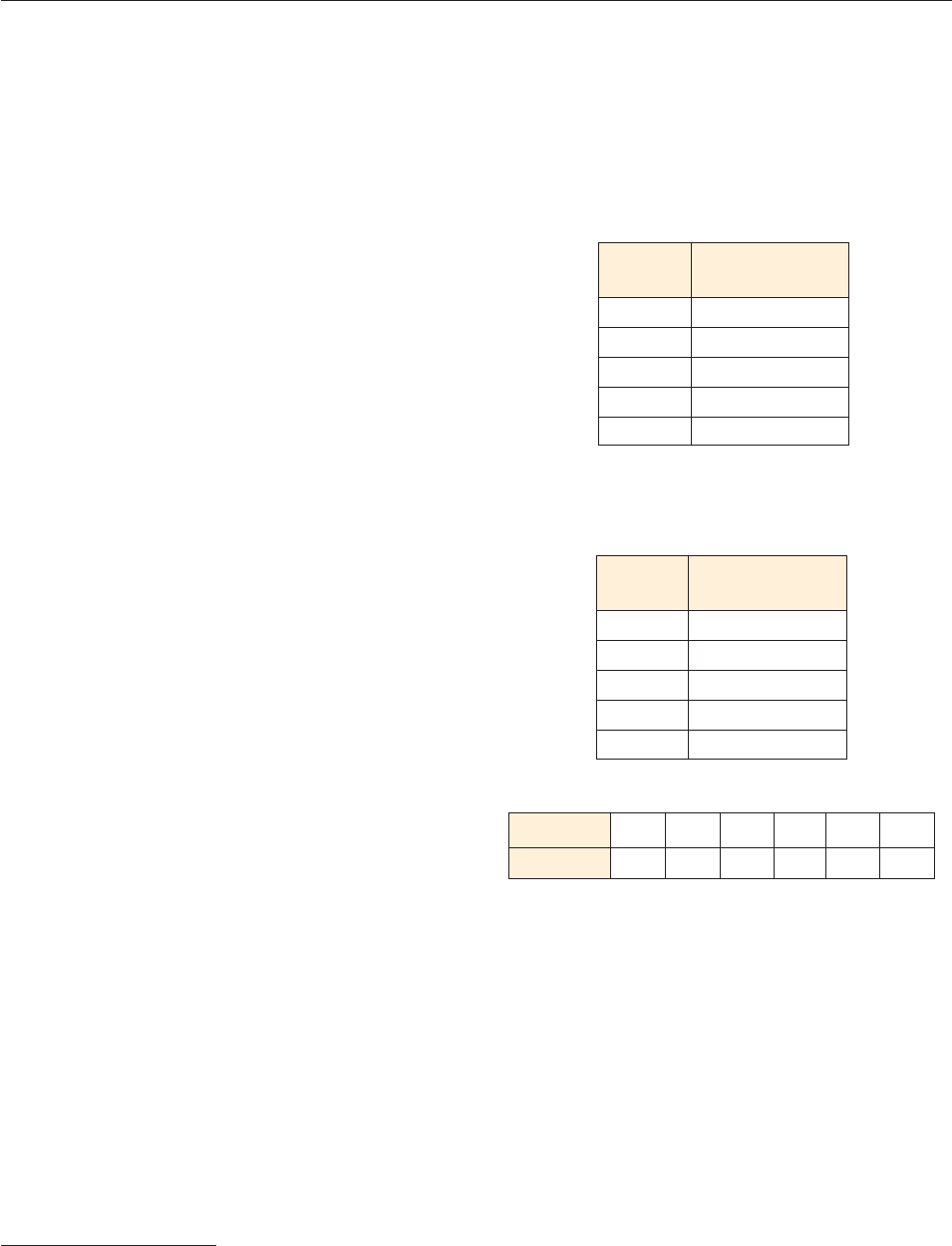
SECTION 5.2 Exponential Functions 367
where x is the height above sea level (in feet) and k is a
constant.
(a) Use the fact that the pressure at sea level is 15 pounds
per square inch to find k.
(b) What is the pressure at 5000 feet?
(c) If you were in a spaceship at an altitude of 160,000 feet,
what would the pressure be?
54. (a) The function g(t) .6 e
0.479t
gives the percentage
of the United States population (expressed as a deci-
mal) that has seen a new television show t weeks after it
goes on the air. According to this model, what percent-
age of people have seen the show after 24 weeks?
(b) The show will be renewed if over half the population
has seen it at least once. Approximately when will 50%
of the people have seen the show?
(c) According to this model, when will 59.9% of the people
have seen it? When will 60% have seen it?
55. According to data from the National Center for Health Sta-
tistics, the life expectancy at birth for a person born in a year
x is approximated by the function
D(x)
(1900 x 2050).
(a) What is the life expectancy of someone born in 1980?
in 2000?
(b) In what year was life expectancy at birth 60 years?
56. The number of subscribers to basic cable TV (in millions)
can be approximated by
g(x)
1 1
7
6
6
(
.
.
7
8444
x
)
,
where x 0 corresponds to 1970.*
(a) Estimate the number of subscribers in 2005 and 2010.
(b) When does the number of subscribers reach 70 million?
(c) According to this model, will the number of subscribers
ever each 90 million?
57. (a) The beaver population near a certain lake in year t is
approximately
p(t)
1 1
2
9
0
9
0
e
0
.5544t
.
What is the population now (t 0) and what will it be
in 5 years?
(b) Approximately when will there be 1000 beavers?
58. The Gateway Arch (Figure 5–15) is 630 feet high and
630 feet wide at ground level. Suppose it were placed on a
coordinate plane with the x-axis at ground level and the
y-axis going through the center of the arch. Find a catenary
79.257
1 9.7135 10
24
e
.0304x
function g(x) A(e
kx
e
kx
) and a constant C such that the
graph of the function f (x) g(x) C provides a model of
the arch. [Hint: Experiment with various values of A, k, C
as in the Graphing Exploration on page 365. Many correct
answers are possible.]
59. (a) A genetic engineer is growing cells in a fermenter. The
cells multiply by splitting in half every 15 minutes. The
new cells have the same DNA as the original ones.
Complete the following table.
(b) Write the rule of the function that gives the number of C
cells at time t hours.
60. Do Exercise 59, using the following table, instead of the
given one.
61. A weekly census of the tree-frog population in Frog Hollow
State Park produces the following results.
(a) Find a function of the form f (x) Pa
x
that describes
the frog population at time x weeks.
(b) What is the growth factor in this situation (that is, by
what number must this week’s population be multiplied
to obtain next week’s population)?
(c) Each tree frog requires 10 square feet of space and the
park has an area of 6.2 square miles. Will the space re-
quired by the frog population exceed the size of the
park in 12 weeks? In 14 weeks? [Remember: 1 square
mile 5280
2
square feet.]
62. An eccentric billionaire offers you a job for the month of
September. She says that she will pay you 2¢ on the first
day, 4¢ on the second day, 8¢ on the third day, and so on,
doubling your pay on each successive day.
(a) Let P(x) denote your salary in dollars on day x. Find the
rule of the function P.
(b) Would you be better off financially if instead you were
paid $10,000 per day? [Hint: Consider P(30).]
Time
(hours) Number of Cells
01
.25 2
.5 4
.75
1
Time
(hours) Number of Cells
0 300
.25 600
.5 1200
.75
1
*Based on data from The Cable TV Financial Datebook and The Pay
TV Newsletter.
Week 123456
Population 18 54 162 486 1458 4374
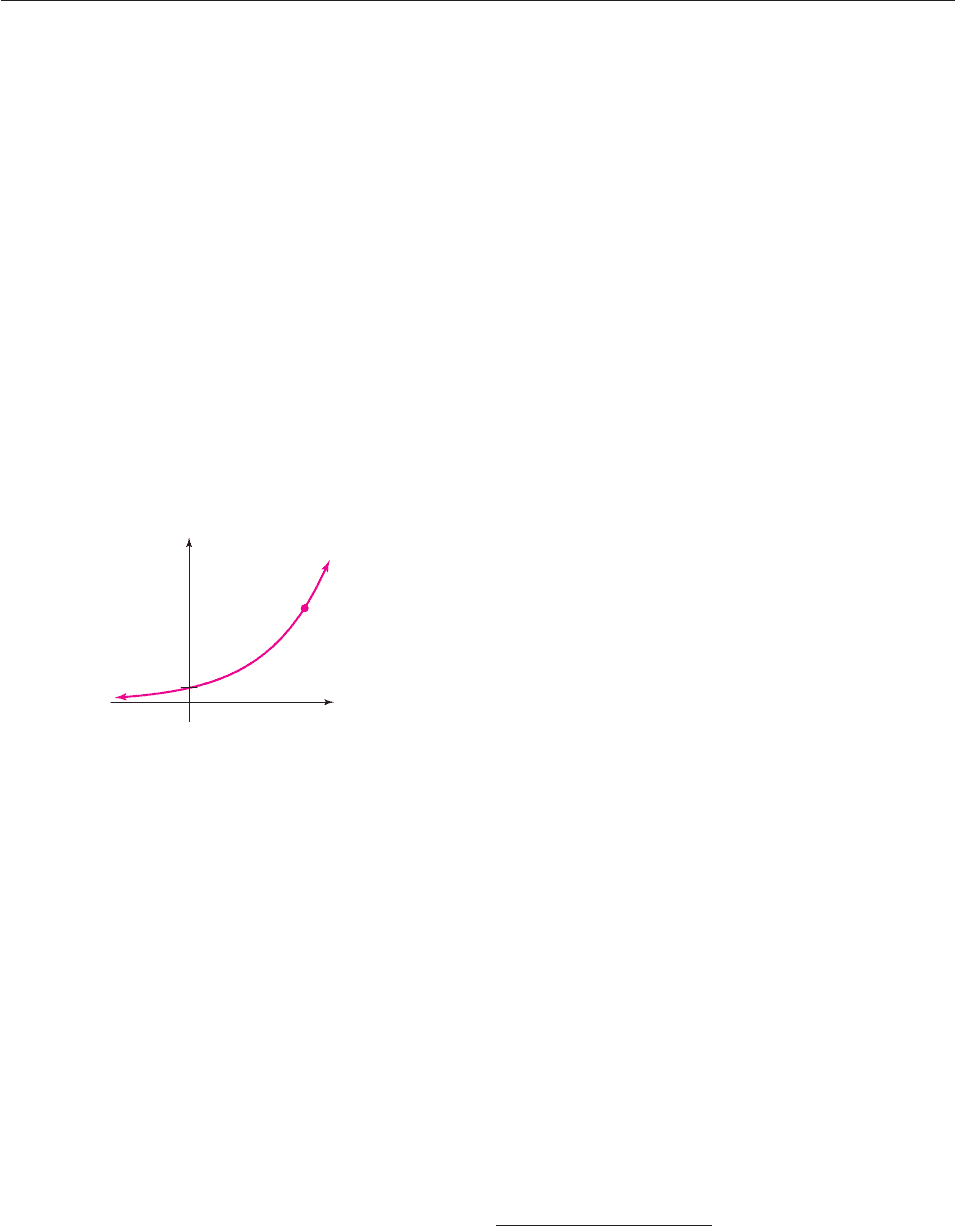
368 CHAPTER 5 Exponential and Logarithmic Functions
63. Take an ordinary piece of typing paper and fold it in half; then
the folded sheet is twice as thick as the single sheet was. Fold
it in half again so that it is twice as thick as before. Keep fold-
ing it in half as long as you can. Soon the folded paper will be
so thick and small that you will be unable to continue, but
suppose you could keep folding the paper as many times as
you wanted. Assume that the paper is .002 inches thick.
(a) Make a table showing the thickness of the folded paper
for the first four folds (with fold 0 being the thickness
of the original unfolded paper).
(b) Find a function of the form f (x) Pa
x
that describes
the thickness of the folded paper after x folds.
(c) How thick would the paper be after 20 folds?
(d) How many folds would it take to reach the moon
(which is 243,000 miles from the earth)? [Hint: One
mile is 5280 feet.]
64. The figure is the graph of an exponential growth function
f (x) Pa
x
.
(a) In this case, what is P? [Hint: What is f (0)?]
(b) Find the rule of the function f by finding a. [Hint: What
is f (2)?]
65. Suppose you invest $1200 in an account that pays 4% inter-
est, compounded annually and paid from date of deposit to
date of withdrawal.
(a) Find the rule of the function f that gives the amount you
would receive if you closed the account after x years.
(b) How much would you receive after 3 years? After
5 years and 9 months?
(c) When should you close the account to receive $1850?
66. Anne now has a balance of $800 on her credit card, on
which 1.5% interest per month is charged. Assume that she
makes no further purchases or payments (and that the
credit card company doesn’t turn her account over to a bill
collector).
(a) Find the rule of the function g that gives Anne’s total
credit card debt after x months.
(b) How much will Anne owe after one year? After two
years?
(c) When will she owe twice the amount she owes now?
67. The population of Mexico was 100.4 million in 2000 and is
expected to grow at the rate of 1.4% per year.
(a) Find the rule of the function f that gives Mexico’s pop-
ulation (in millions) in year x, with x 0 corresponding
to 2000.
x
y
(2, 36)
4
(b) Estimate Mexico’s population in 2010.
(c) When will the population reach 125 million people?
68. The number of digital devices (such as MP3 players, hand-
held computers, cell phones, and PCs) in the world was
approximately .94 billion in 1999 and is growing at a rate of
28.3% a year.*
(a) Find the rule of a function that gives the number of dig-
ital devices (in billions) in year x, with x 0 corre-
sponding to 1999.
(b) Approximately how many digital devices will be in use
in 2010?
(c) If this model remains accurate, when will the number of
digital devices reach 6 billion?
69. The U.S. Census Bureau estimates that the Hispanic popu-
lation in the United States will increase from 32.44 million
in 2000 to 98.23 million in 2050.
†
(a) Find an exponential function that gives the Hispanic
population in year x, with x 0 corresponding to 2000.
(b) What is the projected Hispanic population in 2010 and
2025?
(c) In what year will the Hispanic population reach
55 million?
70. The U.S. Department of Commerce estimated that there
were 54 million Internet users in the United States in 1999
and 85 million in 2002.
(a) Find an exponential function that models the number of
Internet users in year x, with x 0 corresponding to
1999.
(b) For how long is this model likely to remain accurate?
[Hint: The current U.S. population is about 305 million.]
71. At the beginning of an experiment, a culture contains 200
H. pylori bacteria. An hour later there are 205 bacteria.
Assuming that the H. pylori bacteria grow exponentially,
how many will there be after 10 hours? After 2 days?
72. The population of India was approximately 1030 million in
2001 and was 967 million in 1997. If the population contin-
ues to grow exponentially at the same rate, what will it be in
2010?
73. Kerosene is passed through a pipe filled with clay to remove
various pollutants. Each foot of pipe removes 25% of the
pollutants.
(a) Write the rule of a function that gives the percentage of
pollutants remaining in the kerosene after it has passed
through x feet of pipe. [See Example 7.]
(b) How many feet of pipe are needed to ensure that 90% of
the pollutants have been removed from the kerosene?
74. If inflation runs at a steady 3% per year, then the amount a
dollar is worth decreases by 3% each year.
*Based on data and projections from IDC.
†
Statistical Abstract of the United States: 2007.
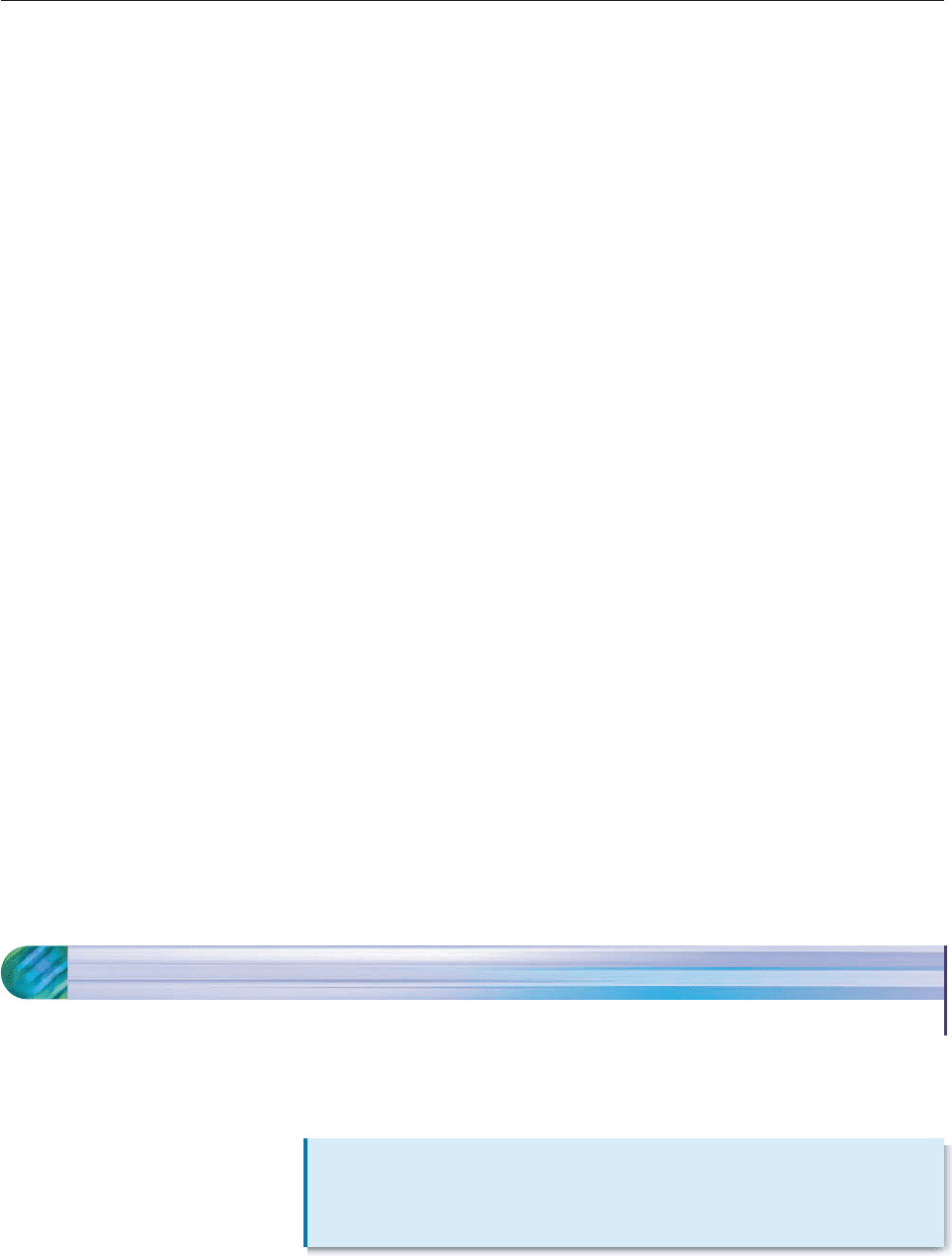
SPECIAL TOPICS 5.2.A Compound Interest and the Number e 369
(a) Write the rule of a function that gives the value of a dol-
lar in year x.
(b) How much will the dollar be worth in 5 years? In
10 years?
(c) How many years will it take before today’s dollar is
worth only a dime?
75. You have 5 grams of carbon-14, whose half-life is
5730 years.
(a) Write the rule of the function that gives the amount of
carbon-14 remaining after x years. [See the box preced-
ing Example 8.]
(b) How much carbon-14 will be left after 4000 years?
After 8000 years?
(c) When will there be just 1 gram left?
76. (a) The half-life of radium is 1620 years. If you start with
100 milligrams of radium, what is the rule of the func-
tion that gives the amount remaining after t years?
(b) How much radium is left after 800 years? After
1600 years? After 3200 years?
THINKERS
77. Find a function f (x) with the property f (r s) f (r)f (s) for
all real numbers r and s.
78. Find a function g(x) with the property g(2x) (g(x))
2
for
every real number x.
79. (a) Using the viewing window with 4 x 4 and
1 y 8, graph f (x)
1
2
x
and g(x) 2
x
on the same
screen. If you think of the y-axis as a mirror, how would
you describe the relationship between the two graphs?
(b) Without graphing, explain how the graphs of g(x) 2
x
and k(x) 2
x
are related.
80. Look back at Section 4.4, where the basic properties of
graphs of polynomial functions were discussed. Then
review the basic properties of the graph of f (x) a
x
dis-
cussed in this section. Using these various properties, give
an argument to show that for any fixed positive number
a(1), it is not possible to find a polynomial function
g(x) c
n
x
n
c
1
x c
0
such that a
x
g(x) for all
numbers x. In other words, no exponential function is a
polynomial function. However, see Exercise 81.
81. Approximating exponential functions by polynomials.
For each positive integer n, let f
n
be the polynomial function
whose rule is
f
n
(x) 1 x
x
2
2
!
x
3
3
!
x
4
4
!
x
n
n
!
,
where k! is the product 1
2
3
k.
(a) Using the viewing window with 4 x 4 and
5 y 55, graph g(x) e
x
and f
4
(x) on the same
screen. Do the graphs appear to coincide?
(b) Replace the graph of f
4
(x) by that of f
5
(x), then by f
6
(x),
f
7
(x), and so on until you find a polynomial f
n
(x) whose
graph appears to coincide with the graph of g(x) e
x
in
this viewing window. Use the trace feature to move
from graph to graph at the same value of x to see how
accurate this approximation is.
(c) Change the viewing window so that 6 x 6 and
10 y 400. Is the polynomial you found in part (b)
a good approximation for g(x) in this viewing window?
What polynomial is?
82. This exercise provides a justification for the claim that the
function M(x) c(.5)
x/h
gives the mass after x years of a
radioactive element with half-life h years. Suppose we
have c grams of an element that has a half-life of 50 years.
Then after 50 years, we would have c
1
2
grams. After
another 50 years, we would have half of that, namely,
c
1
2
1
2
c
1
2
2
.
(a) How much remains after a third 50-year period? After a
fourth 50-year period?
(b) How much remains after t 50-year periods?
(c) If x is the number of years, then x/50 is the number of
50-year periods. By replacing the number of periods t
in part (b) by x/50, you obtain the amount remaining
after x years. This gives the function M(x) when h 50.
The same argument works in the general case (just
replace 50 by h). Find M(x).
5.2.A SPECIAL TOPICS Compound Interest and the Number e
Section Objective
■ Apply compound interest formulas to financial situations.
When money earns compound interest, as in Example 4 on page 360, the expo-
nential growth function can be described as follows.
Compound
Interest Formula
If P dollars is invested at interest rate r per time period (expressed as a dec-
imal), then the amount A after t periods is
A P(1 r)
t
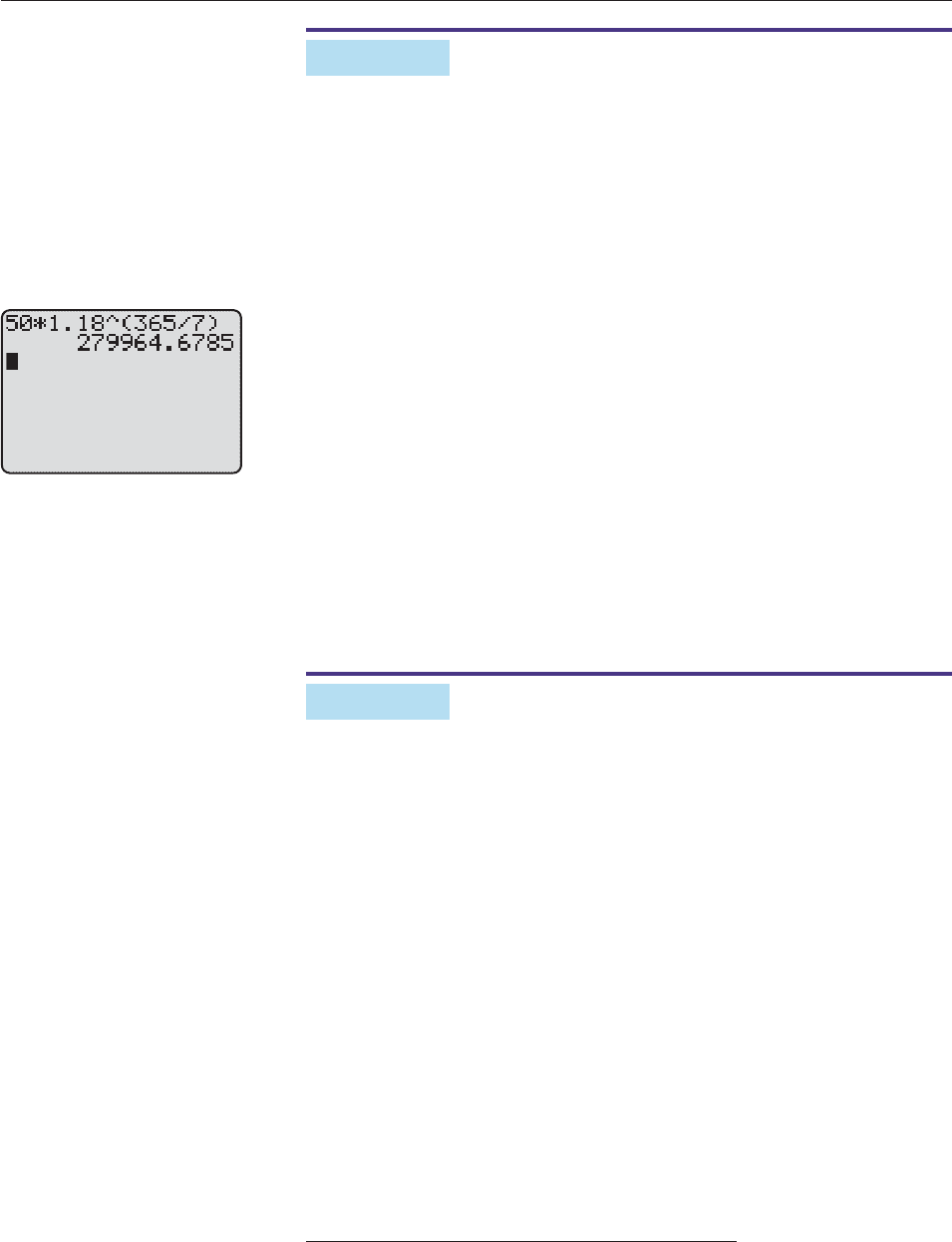
370 CHAPTER 5 Exponential and Logarithmic Functions
EXAMPLE 1
Suppose you borrow $50 from your friendly neighborhood loan shark, who
charges 18% interest per week. How much do you owe after one year (assuming
that he lets you wait that long to pay)?
SOLUTION You use the compound interest formula with P 50, r .18, and
t 52 (because interest is compounded weekly and there are 52 weeks in a year).
So you figure that you owe
A P(1 r)
t
50(1 .18)
52
50
1.18
52
$273,422.58.*
When you try to pay the loan shark this amount, however, he points out that a
365-day year has more than 52 weeks, namely,
36
7
5
52
1
7
weeks. So you recal-
culate with t 365/7 (and careful use of parentheses, as shown in Figure 5–16)
and find that you actually owe
A P(1 r)
t
50(1 .18)
365/7
50
1.18
365/7
$279,964.68.
Ouch! ■
As Example 1 illustrates, the compound interest formula can be used even
when the number of periods t is not an integer. You must also learn how to read
“financial language” to apply the formula correctly, as shown in the following
example.
EXAMPLE 2
Determine the amount a $3500 investment is worth after three and a half years at
the following interest rates:
(a) 6.4% compounded annually;
(b) 6.4% compounded quarterly;
(c) 6.4% compounded monthly.
SOLUTION
(a) Using the compound interest formula with P 3500, r .064, and t 3.5,
we have
A 3500(1 .064)
3.5
$4348.74.
(b) “6.4% interest, compounded quarterly” means that the interest period is
one-fourth of a year and the interest rate per period is .064/4 .016. Since
there are four interest periods per year, the number of periods in 3.5 years is
4(3.5) 14, so
A 3500
1
.0
4
64
14
3500(1 .016)
14
$4370.99.
Figure 5–16
*Here and below, all financial answers are rounded to the nearest penny.
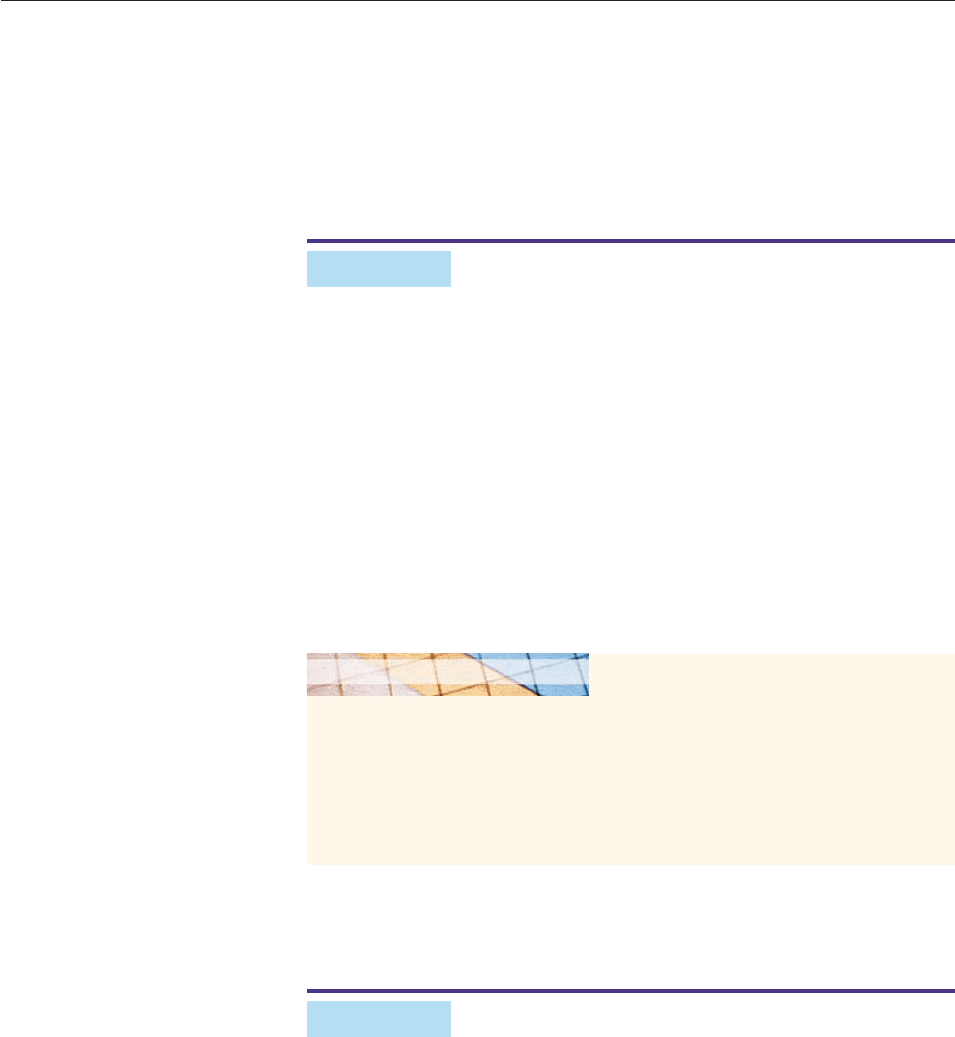
(c) Similarly, “6.4% compounded monthly” means that the interest period is one
month (1/12 of a year) and the interest rate per period is .064/12. The num-
ber of periods (months) in 3.5 years is 42, so
A 3500
1
.0
1
6
2
4
42
$4376.14.
Note that the more often interest is compounded, the larger the final amount ■
EXAMPLE 3
If $5000 is invested at 6.5% annual interest, compounded monthly, how long will
it take for the investment to double?
SOLUTION
The compound interest formula (with P 5000 and r .065/12) shows that the
amount in the account after t months is 5000
1
.0
1
6
2
5
t
. We must find the value
of t such that
5000
1
.0
1
6
2
5
t
10,000.
Algebraic methods for solving this equation will be considered in Section 5.5. For
now, we use technology.
The exploration shows that it will take 128.3 months (approximately 10.7 years)
for the investment to double. ■
EXAMPLE 4
What interest rate, compounded annually, is needed for a $16,000 investment to
grow to $50,000 in 18 years?
SOLUTION In the compound interest formula, we have A 50,000,
P 16,000 and t 18. We must find r in the equation
16,000(1 r)
18
50,000.
The equation can be solved numerically with an equation solver or by one of the
following methods.
SPECIAL TOPICS 5.2.A Compound Interest and the Number e 371
Solve the equation, either by using an equation solver, or by graphical means as fol-
lows. Graph
y 5000
1
.0
1
6
2
5
t
10,000
in a viewing window with 0 t 240 (that’s 20 years) and find the t-intercept.
GRAPHING EXPLORATION
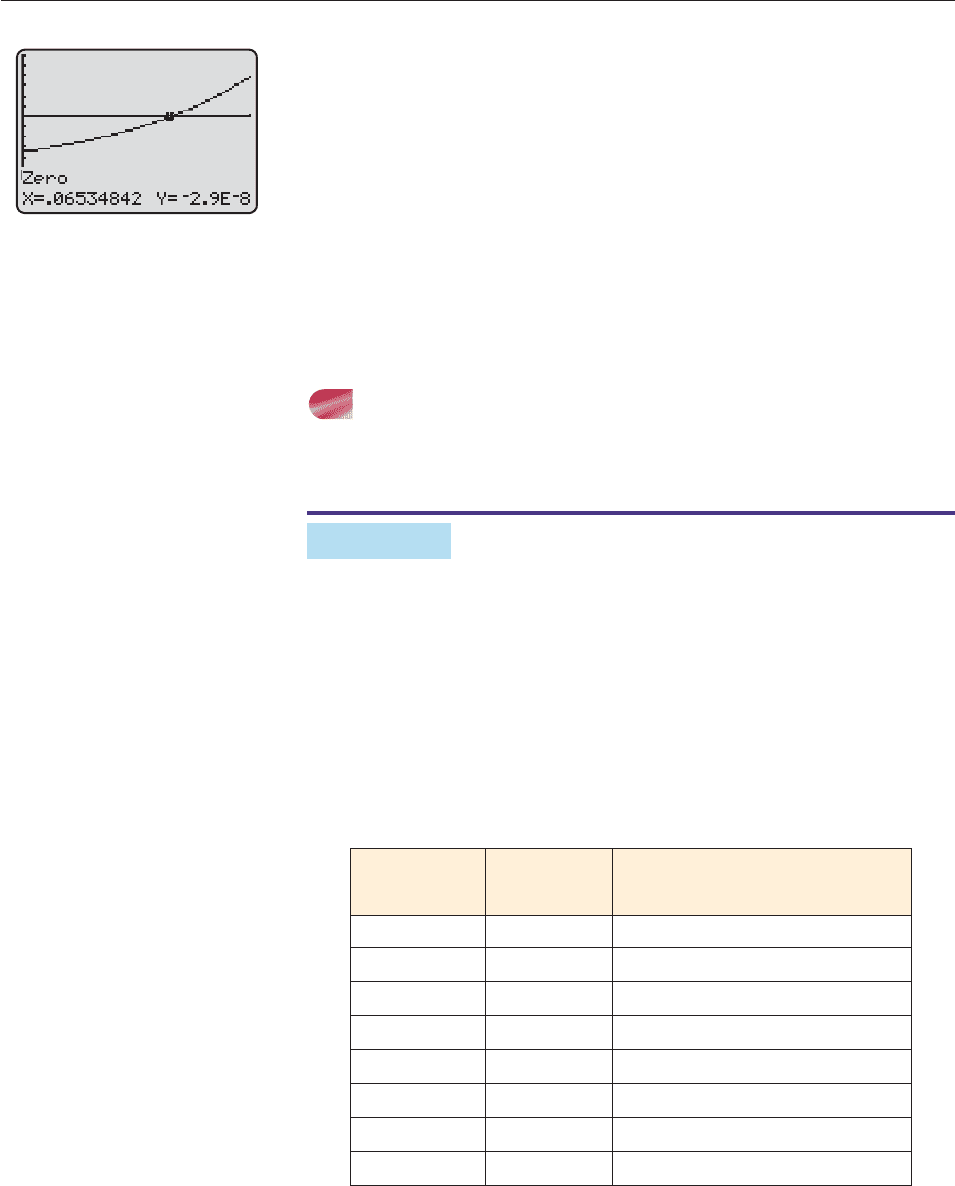
Graphical: Rewrite the equation as 16,000(1 r)
18
50,000 0. Then the
solution is the r-intercept of the graph of y 16,000(1 r)
18
50,000, as shown
in Figure 5–17.
Algebraic:
16,000(1 r)
18
50,000
Divide both sides by 16,000: (1 r)
18
5
1
0
6
,
,
0
0
0
0
0
0
3.125
Take 18th roots on both sides:
18
(1 r
)
18
18
3.125
1 r
18
3.125
r
18
3.125
1 .06535.
So the necessary interest rate is about 6.535%. ■
CONTINUOUS COMPOUNDING AND THE NUMBER e
As a general rule, the more often interest is compounded, the better off you are, as
we saw in Example 2. But there is, alas, a limit.
EXAMPLE 5
The Number e You have $1 to invest for 1 year. The Exponential Bank offers
to pay 100% annual interest, compounded n times per year and rounded to the
nearest penny. You may pick any value you want for n. We have already seen that
the larger n is, the more money you wind up earning. How large should you
choose n in order to make your $1 grow to $5?
SOLUTION Since interest rate is compounded n times per year and the annual
rate is 100% ( 1.00), the interest rate per period is r 1/n and the number of
periods in 1 year is n. According to the formula, the amount at the end of the year
will be A
1
1
n
n
. Here’s what happens for various values of n:
Since interest is rounded to the nearest penny, your dollar will grow no larger than
$2.72, no matter how big n is. You will not be able to make your dollar grow to $5
at that interest rate. ■
372 CHAPTER 5 Exponential and Logarithmic Functions
60,000
−60,000
.1
0
Figure 5–17
Interest Is
Compounded n
1
ᎏ
n
1
ᎏ
n
Annually 1 1
1
1
1
2
Semiannually 2 1
1
2
2
2.25
Quarterly 4 1
1
4
4
2.4414
Monthly 12 1
1
1
2
12
2.6130
Daily 365 1
3
1
65
365
2.71457
Hourly 8760 1
87
1
60
8760
2.718127
Every minute 525,600 1
525
1
,600
525,600
2.7182792
Every second 31,536,000 1
31,53
1
6,000
31,536,000
2.7182818
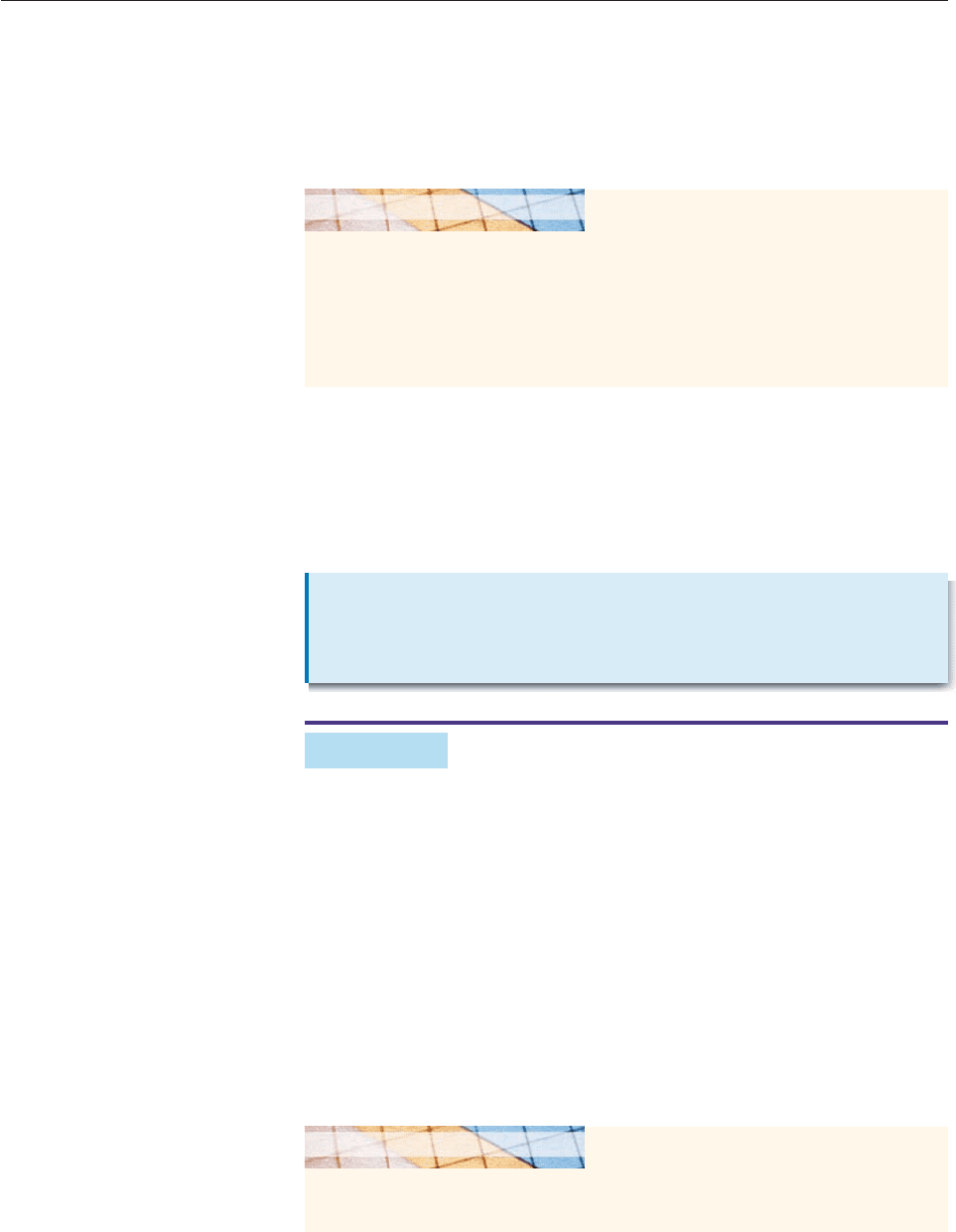
The last entry in the preceding table, 2.7182818, is the number e to seven dec-
imal places. This is just one example of how e arises naturally in real-world
situations. In calculus, it is provided that e is the limit of
1
1
n
n
, meaning that
as n gets larger and larger,
1
1
n
n
gets closer and closer to e.
When interest is compounded n times per year for larger and larger values of
n, as in Example 5, we say that the interest is continuously compounded. In this
terminology, Example 5 says that $1 will grow to $2.72 in 1 year at an interest rate
of 100% compounded continuously. A similar argument with more realistic inter-
est rates (see Exercise 30) produces the following result (Example 5 is the case
when P 1, r 1, and t 1).
EXAMPLE 6
If $3800 is invested in a CD with a 3.8% interest rate, compounded continuously,
find:
(a) The amount in the account after seven and a half years.
(b) The number of years for the account balance to reach $5000.
SOLUTION
(a) Apply the continuous compounding formula with P 3800, r .038, and
t 7.5.
A 3800e
(.038)7.5
3800e
.285
$5053.10.
(b) We must solve the equation
3800e
.038t
5000, or, equivalently, 3800e
.038t
5000 0.
■
SPECIAL TOPICS 5.2.A Compound Interest and the Number e 373
Continuous
Compounding
If P dollars is invested at interest rate r, compounded continuously, then the
amount A after t years is
A Pe
rt
.
Confirm this fact graphically by graphing the function
f (x)
1
1
x
x
and the horizontal line y e in the viewing window with 0 x 5000 and
1 y 4 and noting that the two graphs appear to be identical.
GRAPHING EXPLORATION
Solve the equation graphically and verify that it will take a bit more than seven years
for the investment to be worth $5000.
GRAPHING EXPLORATION

374 CHAPTER 5 Exponential and Logarithmic Functions
EXERCISES 5.2.A
1. If $1,000 is invested at 8%, find the value of the investment
after 5 years if interest is compounded
(a) annually. (b) quarterly. (c) monthly.
(d) weekly.
2. If $2500 is invested at 11.5%, what is the value of the in-
vestment after 10 years if interest is compounded
(a) annually? (b) monthly? (c) daily?
In Exercises 3–10, determine how much money will be in a sav-
ings account if the initial deposit was $500 and the interest rate
is:
3. 3% compounded annually for 8 years.
4. 3% compounded annually for 10 years.
5. 3% compounded quarterly for 10 years.
6. 2.5% compounded annually for 20 years.
7. 2.477% compounded quarterly for 20 years.
8. 2.469% compounded continuously for 20 years.
9. 3% compounded continuously for 10 years, 7 months.
10. 3% compounded continuously for 30 years.
A sum of money P that can be deposited today to yield some
larger amount A in the future is called the present value of A.
In Exercises 11–14, find the present value of the given amount
A. [Hint: Substitute A, the interest rate per period r, and the
number t of periods in the compound interest formula and solve
for P.]
11. $5000 at 6% compounded annually for 7 years.
12. $3500 at 5.5% compounded annually for 4 years.
13. $4800 at 7.2% compounded quarterly for 5 years.
14. $7400 at 5.9% compounded quarterly for 8 years.
15. You are to receive an insurance settlement in the amount of
$8000. Because of various bureaucratic delays, it will take
you about three years to collect your money.
(a) Assuming that your bank offers you an interest rate of
4 percent, compounded continuously, what is the pres-
ent value of your settlement?
(b) If your insurance agent offers you $7050, payable imme-
diately, to give up the settlement, is it best to take the deal?
16. You win a lawsuit, and the defendant is ordered to pay you
$5000, and has up to eight years to pay you. We can assume
that the defendant will probably wait until the last possible
minute to give you your check.
(a) If you can get an interest rate of 3.75 percent on your
money, compounded continuously, what is the present
value of the money in question?
(b) If the defendant offers you $4000 (paid immediately) to
forgive the debt, is it best to take the deal?
17. You have $10,000 to invest for two years. Fund A pays 13.2%
interest, compounded annually. Fund B pays 12.7% interest,
compounded quarterly. Fund C pays 12.6% interest, com-
pounded monthly. Which fund will return the most money?
18. If you invest $7400 for five years, are you better off with an
interest rate of 5% compounded quarterly or 4.8% com-
pounded continuously?
19. If you borrow $1200 at 14% interest, compounded monthly,
and pay off the loan (principal and interest) at the end of two
years, how much interest will you have paid?
20. A developer borrows $150,000 at 6.5% interest, com-
pounded quarterly, and agrees to pay off the loan in four
years. How much interest will she owe?
21. A manufacturer has settled a lawsuit out of court by agree-
ing to pay $1.5 million four years from now. At this time,
how much should the company put in an account paying
6.4% annual interest, compounded monthly, to have
$1.5 million in four years? [Hint: See Exercises 11–14.]
22. Lisa Chow wants to have $30,000 available in five years for
a down payment on a house. She has inherited $25,000. How
much of the inheritance should be invested at 5.7% annual
interest, compounded quarterly, to accumulate the $30,000?
23. If an investment of $1000 grows to $1407.10 in seven years
with interest compounded annually, what is the interest rate?
24. If an investment of $2000 grows to $2700 in three and a half
years, with an annual interest rate that is compounded quar-
terly, what is the annual interest rate?
25. If you put $3000 in a savings account today, what interest
rate (compounded annually) must you receive in order to
have $4000 after five years?
26. If interest is compounded continuously, what annual rate
must you receive if your investment of $1500 is to grow to
$2100 in six years?
27. At an interest rate of 8% compounded annually, how long
will it take to double an investment of
(a) $100 (b) $500 (c) $1200?
(d) What conclusion about doubling time do parts (a)–(c)
suggest?
28. At an interest rate of 6% compounded annually, how long
will it take to double an investment of P dollars?
29. How long will it take to double an investment of $500 at 7%
annual interest, compounded continuously?
THINKERS
30. This exercise provides an illustration of why the continuous
compounding formula (page 373) is valid, using a realistic
interest rate. We shall determine the value of $4000 deposited
for three years at 5% interest compounded n times per year
for larger and larger values of n. In this case, the interest rate
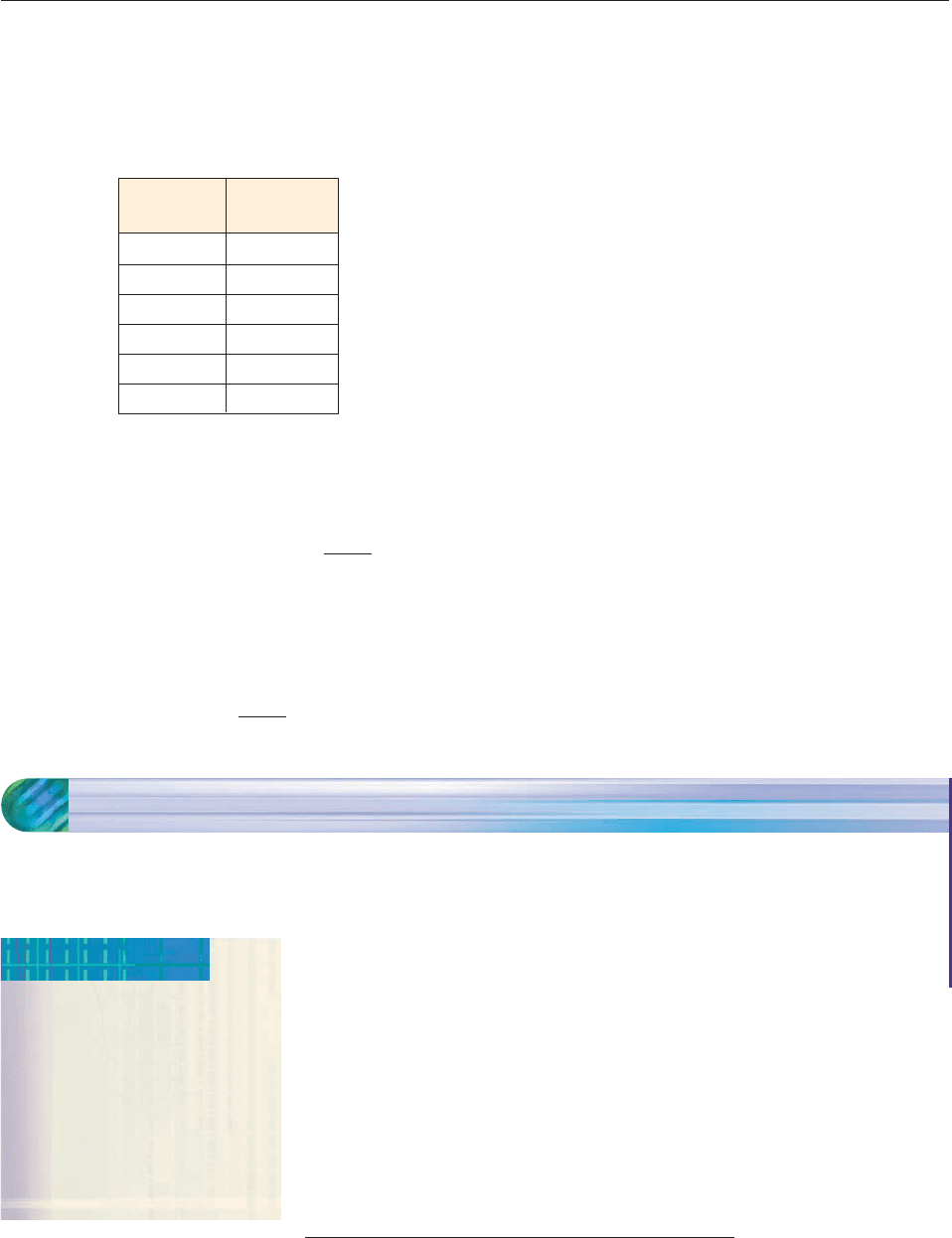
SECTION 5.3 Common and Natural Logarithmic Functions 375
per period is .05/n and the number of periods in three years is
3n. So the amount in the account at the end of three years is:
A 4000
1
.0
n
5
3n
4000
1
.0
n
5
n
3
.
(a) Fill in the missing entries in the following table.
(b) Compare the entries in the second column of the table
with the number e
.05
and fill the blank in the following
sentence:
As n gets larger and larger, the value of
1
.0
n
5
n
gets closer and closer to the number .
(c) Use you answer to part (b) to fill the blank in the fol-
lowing sentence:
As n gets larger and larger, the value of
A 4000
1
.0
n
5
n
3
gets closer and closer to .
(d) Compare your answer in part (c) to the value of the in-
vestment given by the continuous compounding formula.
31. Municipal bonds are investments issued by cities, states, or
counties that wish to raise money to build things like schools,
highways and hospitals. You buy a bond for a certain amount,
and you get an interest payment every six months. Then, at a
certain time (the “maturity date”) you get your principal (the
amount you paid for the bond) back. For example, if you
bought a $10000 bond with a 10% interest rate, you would get
payments of $500 every six months for a while, and then you
would get a payment for $10500 back at the maturity date.
(a) In 2007 Sioux City, Iowa issued $5000 bonds for their
community school district at an interest rate of 3.63%.
The maturity date is October 1, 2012. The interest was
to be paid every April 1 and October 1. If you bought
one of these bonds on April 1, 2007, and held it until the
maturity date, how much total interest will you have
earned?
(b) What if, instead of buying the Sioux City bond, you
could buy a CD (Certificate of Deposit) from a local
bank that paid 3.4%, compounded semi-annually.
Again, assuming you were going to save $5000 from
April 1, 2007 though October 1, 2012, which would be
the better choice and why?
(c) As discussed above, when you buy the Sioux City mu-
nicipal bond, you are getting a payment every six
months. What if you took those interest payments, and
put them in a bank account that pays 3% interest, com-
pounded semi-annually? Now how much total interest
will you have earned on October 1, 2012? Would you
make more money doing this, or buying the CD?
n
1
ᎏ
.0
n
5
ᎏ
n
1,000
10,000
500,000
1,000,000
5,000,000
10,000,000
5.3 Common and Natural Logarithmic Functions*
Section Objectives
■ Evaluate common and natural logarithms.
■ Translate logarithmic statements in exponential statements,
and vice-versa.
■ Use the properties of logarithms.
■ Find the graphs of logarithmic functions.
The discovery of logarithms in the seventeenth century allowed scientists to
perform many crucial computations that previously had been too difficult to be
practical. Although computers now handle these computations, logarithms are still
extremely useful in the sciences and engineering. Logarithmic functions provide
excellent models of different phenomena, including sound volume, earthquake in-
tensity, the perceived brightness of stars, computational complexity, the spread of
certain kinds of diseases, the growth of rumors, and much more. Logarithms also
have properties that make it possible to solve certain types of equations more easily.
We begin with the only logarithms
that are in widespread use,
common and natural logarithms.
Natural logarithms are
emphasized because of their
central role in calculus. Those
who prefer to begin with
logarithms to an arbitrary base b
should cover Special Topics 5.4.A
before reading this section.
*Section 3.7 (Inverse Functions) is a prerequisite for this section.
Roadmap
